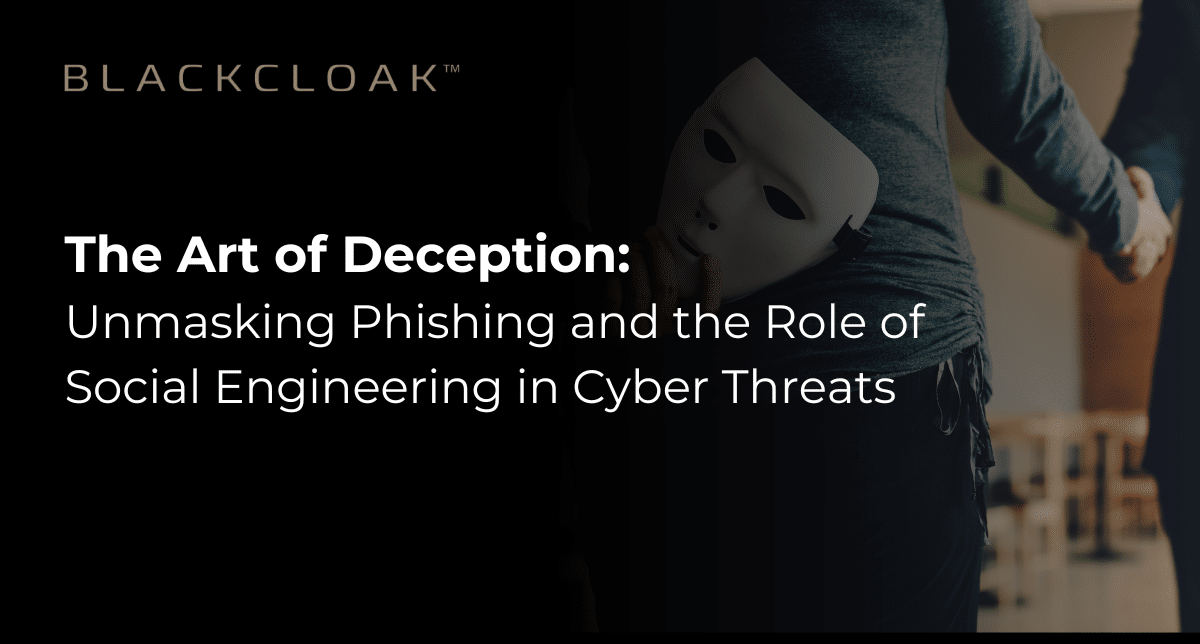The Art of Deception: Unmasking Phishing and the Role of Social Engineering in Cyber Threats

In cybersecurity, one concept stands at the crossroads of technology and human behavior – social engineering. This strategy exploits the human element, manipulating people into divulging confidential information, often without them even realizing they’ve been targeted.
When executed through emails, social engineering transforms into what we know as phishing.
A Deep Dive into Different Kinds of Phishing Scams
Phishing is a deceptive practice employed by cybercriminals, involving the sending of seemingly innocuous emails that impersonate reputable entities or known contacts. These emails are skillfully designed, often including official logos and mirroring the language style of legitimate companies to lull the recipient into a false sense of security.
The hook of these emails? Links to counterfeit websites that prompt you to input your login credentials or phone numbers, or entice you to download malware. These deceptive practices help criminals steal sensitive data, inflict financial damage, or gain unauthorized access to systems.
Spear Phishing
While traditional phishing casts a wide net, spear phishing takes a more targeted approach, honing in on specific individuals or organizations. Cybercriminals invest time and effort in gathering intelligence about their targets, scouring social media profiles, company websites, and other online sources to craft highly personalized messages to their preferred targets—corporate executives or high-access personnel at organizations.
Tailored Deception: What sets spear phishing apart is its level of customization. Attackers leverage the information gleaned about their targets to create emails that appear incredibly authentic and relevant. These messages often mimic the tone, style, and content of legitimate communications, making them extremely convincing. Whether it’s addressing the recipient by name, referencing recent events, or mentioning familiar contacts, spear phishing emails are designed to disarm even the most cautious individuals.
The High-Stakes Game: For high-profile executives and individuals, spear phishing poses a significant threat. By exploiting personal connections, professional relationships, and insider knowledge, cybercriminals can orchestrate sophisticated attacks with devastating consequences. Whether it’s gaining access to sensitive corporate data, siphoning off funds, or tarnishing reputations, the ramifications of a successful spear phishing campaign can be far-reaching and profound.
Pig-Butchering Scams
Another type of unique phishing attack has recently emerged, particularly targeting high-profile executives and individuals of substantial wealth—pig butchering scams.
What are Pig Butchering Scams?: Pig butchering scams operate on the same principles as spear phishing but with a cunning twist. Instead of relying solely on digital deception, these scams often involve intricate schemes that exploit trust and exploit vulnerabilities in high-profile individuals’ personal and professional networks.
Understanding Pig Butchering: What exactly is pig butchering in the context of cybersecurity? Pig butchering refers to the sophisticated manipulation tactics employed by cybercriminals to extract sensitive information, financial assets, or access to valuable resources from their targets. The term “pig” metaphorically represents the high-value targets, while “butchering” symbolizes the ruthless exploitation of trust and relationships.
How Pig Butchering Targets High-Profile Individuals: High-profile executives and individuals with significant wealth are prime targets for pig butchering scams due to their influence, access to sensitive information, and potential financial resources. Cybercriminals meticulously craft their schemes to bypass traditional security measures, leveraging social engineering tactics tailored to their targets’ profiles and behaviors.
The Role of Crypto in Pig Butchering: In recent years, pig butchering scams have evolved to incorporate cryptocurrencies. By exploiting the anonymity and decentralization of blockchain technology, cybercriminals can launder money, facilitate fraudulent transactions, and evade detection more effectively.
Additionally, in recent months, BlackCloak has identified a surge of cyber attacks that specifically target venture capital and private equity firms that have invested in crypto.
Combating Phishing: Proactive Steps for Your Cybersecurity
Recognizing and resisting phishing, spear phishing, and pig-butchering attempts is paramount for safeguarding your digital world. Here are some actionable steps you can take to fortify your defenses:
- Scrutinize the sender: Always check who sent the email and examine the email address carefully. Cybercriminals often use addresses that look similar to genuine ones with slight variations.
- Look for telltale signs: Phishing emails often contain spelling errors, typographical mistakes, and poor grammar—signs not typically seen in professional communications from reputable organizations.
- Treat links and attachments with suspicion: Be extremely cautious with emails that contain links or attachments. Avoid clicking or downloading anything unless you are sure of the sender’s legitimacy.
- Be alert to emotional manipulation: Phishing emails often use tactics to incite panic or a sense of urgency. Threats of account closures, warnings of unauthorized activity, or requests for immediate action are common red flags. Pig-butchering scams will often try to use a false sense of intimacy to gain your trust, so it’s important to always remain vigilant.
- Delete and block: If you suspect an email is a phishing attempt, delete it immediately and consider blocking the sender to prevent future emails, texts, or calls.
Maintaining your cybersecurity in the face of ever-evolving threats like phishing can be challenging, but by staying informed and vigilant, you can significantly reduce your risk. Remember, at BlackCloak, we are committed to guiding and supporting your journey towards a secure digital life. The art of deception may be complex, but with awareness, we can unveil its disguise.
Request a demo to discover how BlackCloak can protect you, your family, and your privacy.








